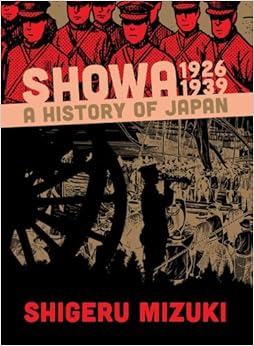Author: Shigeru Mizuki
 |
| via Amazon |
Mizuki intersperses his own personal history with the major political and military events of the time period. There is quite a bit of overlap with his earlier work NonNonBa (review here) but Showa covers a broader portion of his life. The account of Japanese history begins with the 1923 earthquake. The economic recovery, along with oppressive government policies, drove much of the country to financial ruin and starvation. Failed coup attempts served as excuses for tightening the tyrannical grip on the populace. Just as in Nazi Germany, military might became a source of pride for a nation in dire straits.
In typical manga fashion, the book has extreme contrasts in artistic style. Most characters, including all of those from Mizuki's own life, are presented in near-caricature form. Real-life historical images, on the other hand, are hyper-realistic. A few panels, in fact, are obviously rendered from old newspaper photographs (Shigeru was an obsessive scrapbook keeper as a child).
I've been reading a lot about 20th century Japanese history recently. Along with this book, I've also read the first three volumes of Keiji Nakazawa's Barefoot Gen series and Yoshihiro Tatsumi's autobiographical work A Drifting Life. Japan is, in many ways, still coming to grips with its War and pre-War history. Its relationships with other Asian countries are still compromised by Japan's refusal to formally apologize for the atrocities committed in the Pacific Theater. Japanese aggression had begun long before Pearl Harbor with the attack on Manchuria in 1931. One could even go back to the forced annexation of Korea in 1910. Officially demilitarized for nearly 70 years, modern Japan has little sense of this history. Perhaps it's just as well that the Japanese should think of themselves as a peaceful nation. After all, by 21st century standards, it is. However, one wonders how the country might change once pre-1945 Japan passes from living memory. Mizuki's account is unflattering and uncompromising, sure to be a meaningful record for future generations.
That time in history is a real mystery thanks to the foreign policy at the time, so these books are important. It sounds like a great read A.S.
ReplyDeleteYes, this series is sure to be well worth checking out for anyone with an interest in Japan or 20th century history.
DeleteThis sounds very interesting. I would like to read this so it will go on my list.
ReplyDeleteI remember when I was at the Osamu Tezuka Museum and seeing his reminisces of the war done in beautiful animation.
cheers, parsnip
I haven't seen any of Tezuka's war work. I'll keep an eye out for it.
DeleteJapan is steeped with a fascinating timeline, like the Nara Period which marked the first emergence of a Strong Japanese State. I dig the really ancient decorative temples and statues. It must have been cool to be a samurais.
ReplyDeleteHave you ever been, Spacer Guy? I highly recommend a trip if you ever have the chance. You could easily spend a year, just visiting temples. And there is so much more...
DeleteAnything that expands our knowledge of the other hemisphere get's brownie points from me. It's a black hole for many people, and there's really no reason why American classrooms don't teach more Chinese, Japanese and Indian history at a minimum.
ReplyDeleteBoy, I'm with you there. Over half the world's population and an ever-increasing portion of its wealth resides in Asia, after all, not to mention most of the major hot spots of world conflict. But let's not kid ourselves. Americans could stand a better sense of their own history, too.
DeleteWe love history in my house. We're knee deep in it (DAR, CAR, America's First Families). I'm also a genealogist nerd.
DeleteMy father's the genealogist in our family. It's fascinating stuff.
DeleteWhat an interesting review. I have to admit this is a period of history that I don't know much about. I am always up for learning though- so thanks for sharing. :) ~Jess
ReplyDeleteMy pleasure, Jess!
DeleteThis sounds really awesome. I'm curious about how much time you devote to reading, it makes me jealous. Love me some Japan, and thank you for promoting this.
ReplyDeleteIn summer, a great deal of my time. I head back to work on Wednesday. I won't be breezing through the stack at anywhere near the same pace.
DeleteLooks like an interesting read. I don't know too much about Japanese history, but I'd like to learn more.
ReplyDeleteFascinating stuff.
DeleteIt's both understandable and unfortunate that both Japan and Germany don't really want to address WWII.
ReplyDeleteGermany has done much better, though. There have been formal apologies. Even while they were two countries, both Germanies did everything they could to distance themselves from the Nazis. Who could blame them? It's been a different story for Japan. Many in the region still see the Japanese as having a patronizing view of the rest of Asia. Whether that's fair or not, official statements would be powerful. But I don't see it happening, at least not soon enough for it to mean anything for those who remember the War.
DeleteI studied Japanese history, from ancient to modern, in high school, but don't remember a whole lot of it now. The main thing I remember is learning about harakiri ;)
ReplyDeleteI think history in manga is a really cool way for people to learn - and definitely not just kids!
This book's definitely not for children. There's nothing inappropriate, exactly, but it's heavy stuff. I agree with you. Graphic novels are a great way to make history more accessible for all of us.
Delete